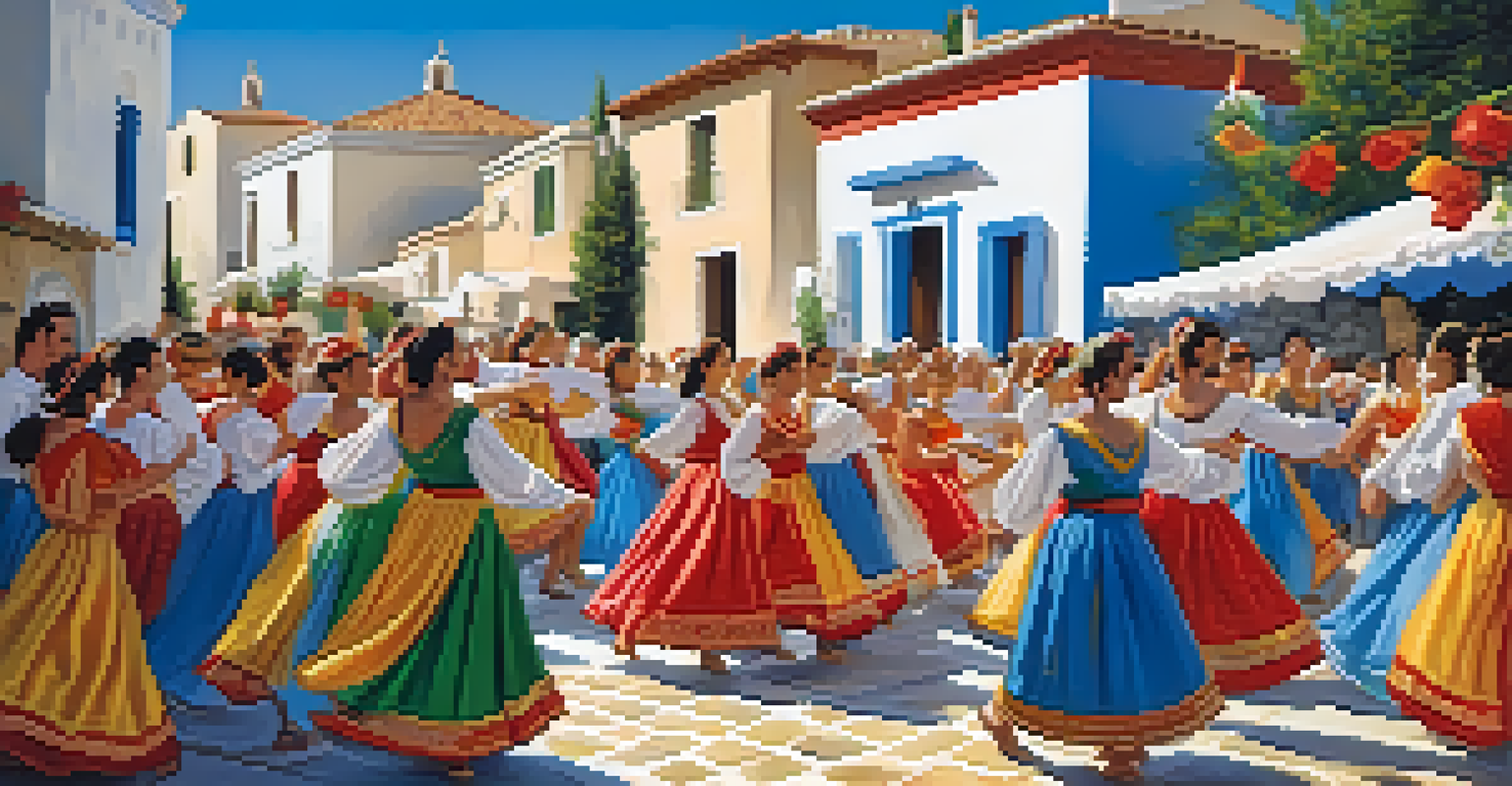Greek Music: Theoretical Foundations and Cultural Significance

The Historical Evolution of Greek Music
Greek music has a rich history that dates back to ancient times, reflecting the various cultural influences that have shaped it. From the epic poems of Homer, where music played a vital role in storytelling, to the Byzantine chants that emerged in the Middle Ages, each era contributed to its evolution. The incorporation of folk elements and the impact of neighboring cultures further enriched this musical tapestry.
Music is a world within itself; it's a language we all understand.
As the centuries progressed, Greek music continued to evolve, integrating new instruments and styles. The introduction of the lute and the violin created a dynamic soundscape that blended traditional melodies with modern influences. This adaptability has allowed Greek music to remain relevant, resonating with audiences both locally and globally.
Today, we can trace the lineage of contemporary Greek music back to its ancient roots, showcasing a vibrant fusion of past and present. Artists like Mikis Theodorakis and contemporary pop stars have revitalized traditional sounds, ensuring that the essence of Greek music endures. This historical journey not only highlights the music's evolution but also its deep cultural significance.
Theoretical Foundations: Scales and Modes in Greek Music
At the heart of Greek music lies a complex system of scales and modes that form its theoretical foundation. The use of the Dorian, Phrygian, and Mixolydian modes, for instance, creates distinctive melodic qualities that evoke various emotions. These modes are integral to understanding the structure and feel of Greek musical compositions.

Unlike Western music, which often relies on major and minor scales, Greek music embraces a broader spectrum of tonality. This diversity allows for rich improvisation, a hallmark of many traditional performances. Musicians often draw upon this theoretical framework to express their individual artistry while remaining rooted in cultural tradition.
Rich History of Greek Music
Greek music has evolved through ancient times to modern influences, showcasing a vibrant blend of cultural traditions.
Exploring these theoretical aspects reveals how they contribute to the overall character of Greek music. The interplay between modes and scales not only shapes the sound but also influences the listener's experience. This intricate relationship between theory and practice enhances our appreciation of this vibrant musical tradition.
Instruments: The Heartbeat of Greek Music
Greek music is characterized by a unique array of instruments, each contributing to its distinct sound. The bouzouki, a stringed instrument, is often considered the emblem of Greek music, bringing both joy and nostalgia to its melodies. Other instruments, such as the laouto and baglama, add depth and texture, creating a rich sonic landscape.
The music of the people is the soul of the nation.
These instruments are not merely tools; they embody the spirit of Greek culture and tradition. When played, they tell stories of love, loss, and everyday life, resonating with listeners on an emotional level. Whether in a bustling taverna or a grand concert hall, these instruments create an atmosphere that invites participation and connection.
As traditional music evolves, modern interpretations of these instruments continue to emerge. Contemporary artists often experiment with blending traditional sounds with genres like rock and jazz, showcasing the versatility of Greek music. This ongoing dialogue between old and new keeps the musical heritage alive and thriving.
The Role of Folk Songs in Greek Culture
Folk songs hold a special place in Greek culture, serving as a vehicle for storytelling and cultural expression. These songs often reflect the experiences, struggles, and triumphs of everyday people, making them relatable and timeless. They are passed down through generations, preserving the history and identity of communities.
In many regions of Greece, folk songs are integral to celebrations and communal gatherings. They foster a sense of belonging and unity, as people come together to sing and dance. This communal aspect of folk music reinforces cultural bonds and creates lasting memories.
Instruments Shape the Sound
Unique instruments like the bouzouki and laouto are central to Greek music, embodying cultural stories and emotions.
Moreover, folk songs often draw on themes of nature, love, and social issues, providing a commentary on societal values. Through their lyrics and melodies, these songs offer insights into the Greek way of life, showcasing the resilience and spirit of its people. The enduring popularity of folk music underscores its significance in both personal and cultural contexts.
The Influence of Dance on Greek Music
Dance and music are inseparable in Greek culture, each enhancing the other in a vibrant celebration of life. Traditional dances often accompany folk songs, creating an energetic atmosphere that encourages participation. Dancers and musicians work in harmony, each responding to the rhythms and melodies, making every performance a unique experience.
Different regions of Greece boast their own distinct dances, each with its own character and style. For example, the lively syrtaki invites everyone to join in, while the more intricate kalamatianos requires skill and precision. These dances reflect the diversity of Greek culture and the importance of community in celebrating life’s moments.
The relationship between dance and music also serves as a form of expression, allowing individuals to convey emotions and stories through movement. This connection fosters a sense of joy and celebration, whether at weddings, festivals, or family gatherings. As Greek music continues to evolve, the dance remains a vital companion, enriching the cultural landscape.
Modern Greek Music: A Fusion of Influences
Modern Greek music is a vibrant fusion of traditional and contemporary influences, reflecting the globalization of culture. Genres like laïko and rebétiko blend traditional sounds with modern themes, creating a fresh and relatable musical experience. This evolution showcases the adaptability of Greek music, allowing it to resonate with younger audiences while honoring its roots.
Artists today often experiment with various styles, incorporating elements from pop, rock, and even electronic music. This experimentation has led to the emergence of new genres that appeal to diverse tastes, bridging the gap between generations. The ability to fuse different musical elements keeps the Greek music scene dynamic and exciting.
Folk Songs Unite Communities
Folk songs play a crucial role in Greek culture, preserving history and fostering a sense of belonging through shared experiences.
Despite these modern influences, many contemporary artists remain deeply connected to their heritage. They often draw inspiration from traditional melodies and themes, ensuring that the essence of Greek music continues to thrive. This balance between innovation and tradition highlights the enduring significance of Greek music in a rapidly changing world.
The Global Impact of Greek Music
The influence of Greek music extends beyond its borders, impacting various musical traditions worldwide. From the rhythmic patterns of Greek folk music to the emotive melodies of rebetiko, these elements have found their way into the works of international artists. This cross-cultural exchange enriches the global music scene, showcasing the universality of musical expression.
Festivals celebrating Greek music around the world highlight its global appeal, drawing audiences from diverse backgrounds. Events such as the Athens Epidaurus Festival not only showcase traditional performances but also feature modern interpretations, promoting cultural exchange. These gatherings create a shared space for appreciation and understanding of Greek music and culture.

Furthermore, the diaspora plays a significant role in spreading Greek music globally. Immigrants carry their musical traditions with them, creating vibrant communities that celebrate their heritage. This ongoing exchange ensures that Greek music remains a dynamic force, continually evolving while maintaining its cultural significance.